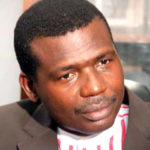OLAMIDE ENIOLA writes that verbal assault on young people especially children could damage their self esteem and leave them permanently seared psychologically by parents who are largely ignorant of what the effect of their verbal assaults cause to their children.
RAISING children comes with its own frustrations and challenges. Unfortunately, in the process, parents, foster parents and guardians sometimes inadvertently abuse those under their wings, leaving long-term psychological injuries on them.
Widow demands DNA, relations weep as army buries slain soldiers
Most parents have the tendency of bringing up their children in a way patterned after the way their own parents brought them up forgetting that they don’t belong to the same generation as their children. In the process, they abuse them.
According to consultant psychiatrist, Dr Jibril Malik, child abuse includes physical, sexual and emotional abuse and child neglect. Part of the emotional abuse he said is verbal assault.
Unfortunately, many parents don›t understand the psychological imports of their actions on their children. While they believe their actions are aimed at correcting the children and/or wards, many of them are not aware of the damage already done to those children/wards.
Children who suffer verbal assaults often develop negative mechanisms to counter such abuses which ultimately affect their world views later in life. Some of them who have abusive parents reported that due to the frequency of such assault on their psyche, such abuses no longer have any effect on them. They have developed immunity and are already used to it.

Sunday Tribune spoke with some young people who shared their experiences. Relating what he underwent, Segun Olaitan said he was always shouted at by his parents whenever he did any wrong thing.
“Being shouted at by my parents whenever I do any wrong is one of my worst experiences because it makes me feel like I can never amount to anything good.”
Another teenager, Princess Hycent, reported that: “My parents do yell at me a lot of times, but that never stopped me from doing what I wanted to do. My dad is a retired public secondary school principal. At some point, I got used to the shouting.”
Mariam Kemisola, who said she was often verbally tongue-lashed like many other young persons, explained that she, sometimes, did not see the use in her parents shouting at her and she would rather be talked to in an amiable manner if she did any wrong.
“I’m the kind of person who, when my parent shouts at me for any reason, always feels bad and even tend to cry most times. Although it is a norm for most parents to shout at their children, in some situations, I wonder why she shouts because I prefer her to sit me down and talk to me about it,” she said.
As for Bolu Samuel, she had developed a phobia of her parents due to their constant verbal assault while Subomi Afolabi, who just finished her secondary school education she had grown so much used to the shouting by her parents that such no longer had any effect on her.
“My mum usually shouts at me most times and when she does, it brings me back to my senses at that point. But the effect does not really last for long because she should not be shouting over everything. In fact, I am used to the shouting,” she said.

Experts said children who grew up in an environment where they were yelled at often find it difficult to concentrate on what they do. They are easily distracted; they also said, by loud sounds or shouts because of their previous experience of being shouted at. They argued further that shouting threatens the child and elicits negative responses psychologically.
According to Dr Malik, some parents imagine that verbal assault is better than physical beating. Sometimes they do it out of frustration or irritation, but they are often ignorant of its harmful nature.
According to him, “if parents knew the long term effects (of verbal assault) they would rather do it less frequently. Words are very powerful indeed; they can lift and build up a child or destroy and belittle the child. They can show love and provide comfort or they can be arrows of hatred that pierce into the child and cause significant emotional injury and scars. It is unfortunate that some teachers also indulge in verbal abuse of some children that they do not like in class.
“The effects may be short term and long term. They may become very emotionally unstable and find it difficult to establish friendships or relationships with others – since they always consider themselves unworthy. Their school work may suffer, as they would no longer see any reason to try and work hard, since their motivation levels are low. They may even turn to drug abuse.
“It is best not to speak or beat a child when one is very upset, as one may say very hurtful things that cannot unfortunately be deleted from their memories once they are said. Anger management and self control is critical here. School teachers, caregivers and parents will all benefit from gaining this understanding to help them relate better with children under their care,» he said.
A psychologist, Professor Oluwatoba Samuel Elegbeleye, of the Obafemi Awolowo University, Ile-Ife, while speaking on verbal assault observed that children who are victims of verbal abuse find it difficult to maintain a balanced behavioural profile as they could either do things in excess or underperform.

Elegbeleye attributed these extremities in behaviour, to their constant struggles to please their parents.
“Verbal assault imbues in the child a low self-esteem, and where there is tendency for low self-esteem, it incapacitates competency and self-confidence. And the moment a child starts the journey of his life with low self-esteem, he will under-perform. He won’t be too sure of himself, and therefore, cannot optimise, and where he cannot optimise, there is a very sure possibility that his behavioural potentials will in a way be affected,” he explained.
He added that most time the abuse is not focused on one child but spread round to other children except in case the child involved is being raised by a foster parent, noting that most of the time verbal assault comes from the mother, because she is closer to the children.
Professor Elegbeleye further highlighted five reasons for which parents scream on their children to include parents being brought up the same way; financial or psychological challenges faced by parents; marital problems and a child not living up to expectations.
Proposing possible solutions to the malady, Elegbeleye offered four pieces of advice. “One is let the child have a change of environment. Two, withdraw the child from having contact with such a parent, if it is possible.

“If that is not possible, right parental education is important. The parents too can be subjected to psychotherapy, if it is available.
“If such still persists, I think the best is… an external intervention, no doubt. And usually, counseling or psycho-therapy is external intervention.
Dr Oludele Okewole, an Early Childhood Education expert from the Institute of Education, Obafemi Awolowo University, Ile Ife, Osun State, urged parents to be cautious with their utterances.
“Right from the early childhood stage – because you might say these children are little, they won’t be able to understand, or they won’t be able to remember – at that stage they hold much more information than when they are in advanced stage or even when they are at adolescent stage. That is why as an instructor, as a teacher or as a tutor, one has to be very careful about the choice of words used on these children because you never can tell what they will become in the nearest future.”
“It affects the children emotionally; it affects them physically; it affects them even spiritually.
Verbal abuse undoubtedly has huge repercussions. Dr Okewole, therefore, proposed three possible solutions to it.

“Parents are to use encouraging words. In their highest provocative mood, they should not be releasing words that are quite abusive; words that may even kill the future of the child. The child may not forgive such parent or teacher or a significant other that may be with him in that environment.
“They ought to play around them all the time- teachers, parents and even the nannies that may be working for these children because we believe in an overall development of the child and a particular aspect can disrupt the growth and development of a child if care is not really taken.
“Parents should condemn the act and not the personality of the children. That will really make them to say oh, ‘What daddy/mummy said is right, let me try to change.’”
—Additional report from SHALOM ORIDO






